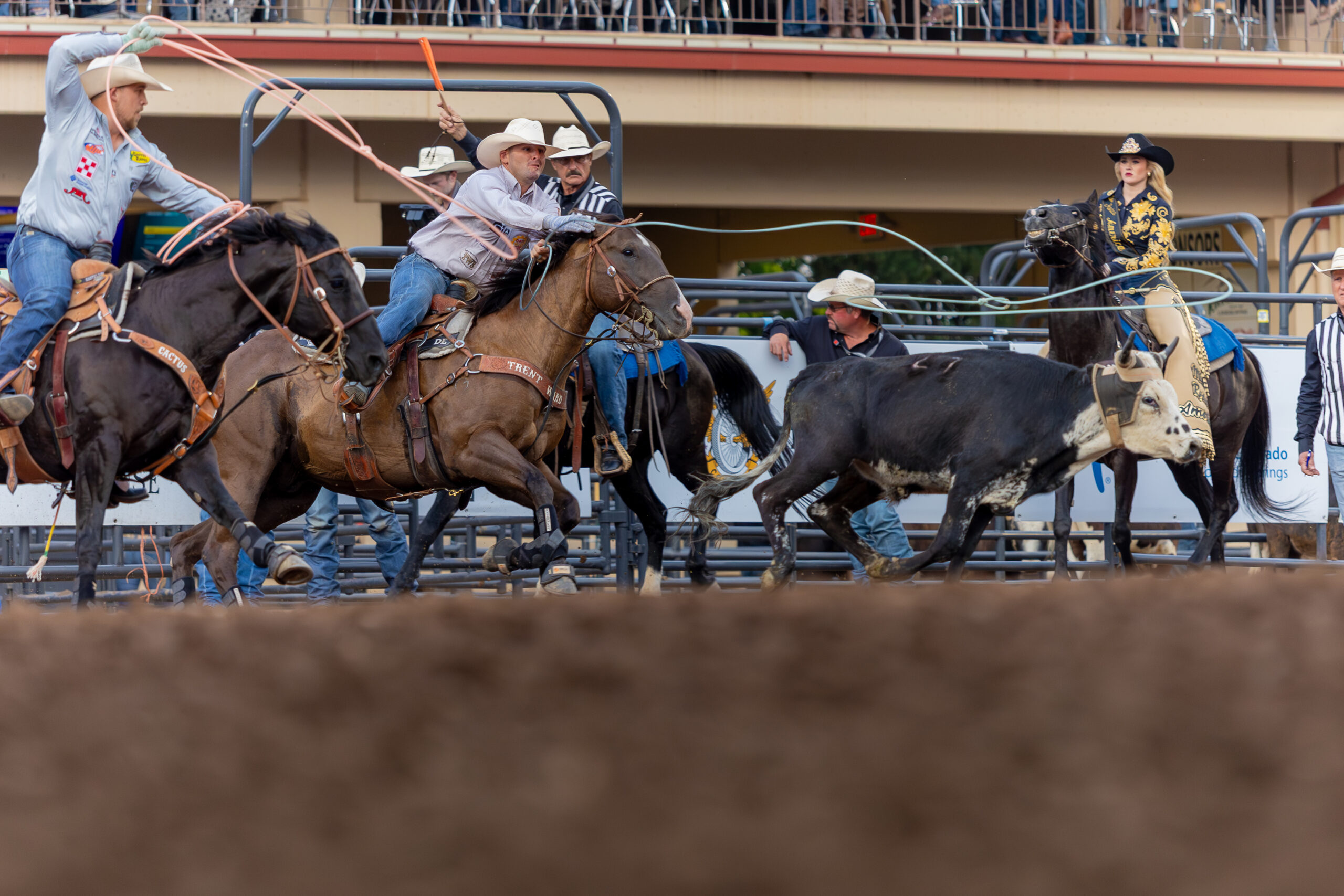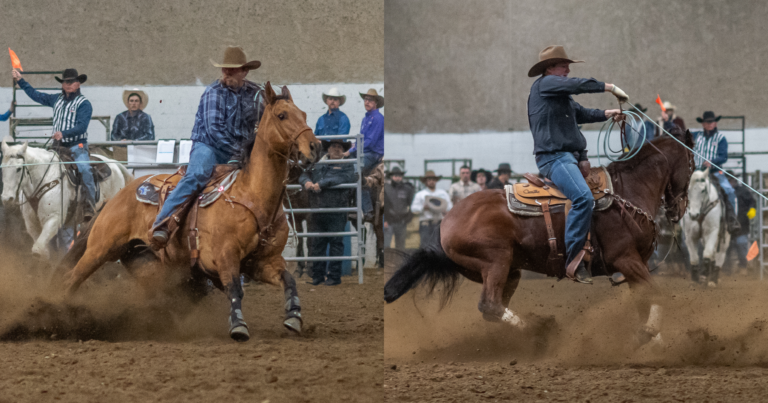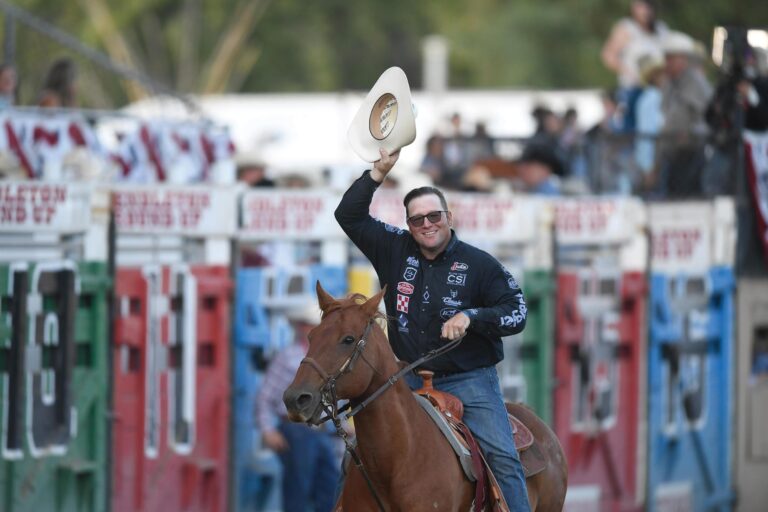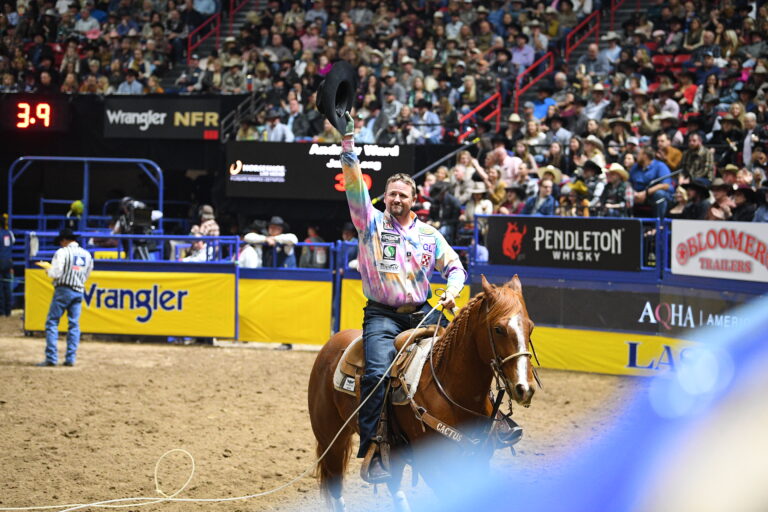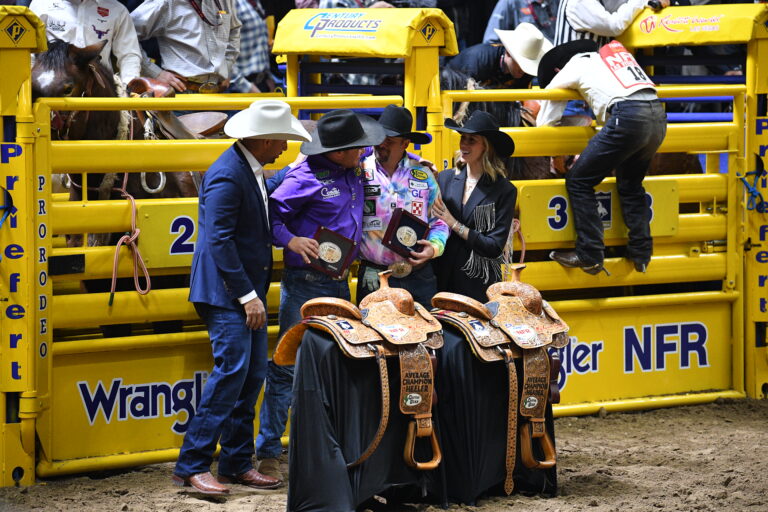Dustin Egusquiza and Levi Lord teamed up to pick up one of the most significant titles and paychecks of the summer, winning the 2025 NFR Open for $15,250 a man July 12.
Egusquiza and Lord capitalized on a quieter short round with a 4.8-second run to win the sudden-death finals. Despite a 20-second run out front, the gunslinging pair knew they couldn’t safety up with three teams to follow if they wanted to walk away with the $13,000 title.
“I was kind of hoping that somebody would put a decent time on the board where you don’t really have that much thought going into it,” admitted seven-time NFR header Egusquiza. “But we had three teams after us, so if we just caught the steer without breaking the barrier or roping a leg, I mean, I think 20.0 was winning it, so we could have still did one or the other and been guaranteed fourth. Which would’ve been fine, but I just decided to give ourselves a chance to win first and hope I didn’t look silly.”
The Colorado Springs payday marked their first national titles and gave Egusquiza a little more cushion at third in the PRCA world standings with $104,387.03 and pushed Lord to No. 2 with $113,013.57. With the NFR Open earnings counting toward the world standings and the winners being guaranteed into the PRCA Playoff Series Finale in Puyallup, Washington, the rodeo has become a significant stop even for NFR guys.
“It’s a great rodeo,” Lord, a four-time NFR heeler, said. “For it to count and to be able to go over there and win–we didn’t win all you could win and won $16,000, I think. So, I can go over there and win $15,000 to $20,000 and it counts in the standings. At this time of the year, it’s definitely an advantage to be over there. The field of contestants is smaller, just each circuit, so only 20 some guys, so that’s a great deal.”
The road to the NFR Open title wasn’t lined with gold for Egusquiza and Lord, who roped in the second set.
“The first round, we probably had the strongest steer of our set and we were actually planning on just kind of making a normal run,” Lord said. “And then Dustin kind of got beat out of there, he said, so he just went and caught. And then I just didn’t do a very good job. I just got in a little bit of a bad spot and rope a leg.”
They were out of the round money with an 11.3 but not yet out of the average, which the top three in advanced to the short round. Being second out in the first round allowed them to rope second to last in Round 2, making it a little easier to not sweat Round 1.
“The team before us that was first out the first day, they missed, so they weren’t a factor for the average,” Egusquiza explained. “We were going to know exactly how fast we needed to be to make it back. Then a couple of the guys bobbled. So, all we needed was a clean run. I don’t think we could have gotten a leg again and made it back, but any kind of clean run would’ve made it back. And we had an amazing steer, so that was nice. On the second one, we kind of just caught him and practiced, and they paid us $2,250. You don’t come across that very often out here in the summertime.”
They picked up second in the round with a 6.5 for $2,250 apiece, advancing them to Saturday night. Though they went on to turn in the fastest run of the rodeo with their 4.8 short round run, it wasn’t on the best steer in the herd.
“They had placed on him the first round and then Wesley (Thorp) missed him in the second round, so if that tells you anything–he never misses,” Lord said. “So, I don’t know. It maybe wasn’t the pick of the pen, but he wasn’t terrible. He kind of took a big hop and shuffled down there a little bit, but it wasn’t too bad.”

Egusquiza called on Cajun Treat, aka “Cajun,” after his young bay “Snoopy” stung himself the night prior in Sheridan, Wyoming.
“He’s been 100% ever since then, but I was a little scared to crank him back out the next day,” Egusquiza said. “I wanted to give him a couple days off. He looks good now though, and Cajun ain’t been doing a whole lot, so it’s good for him.”
There was virtually no doubt Lord would ride “Little Blackie,” registered San Jo Deacon. Though he’s only had him a short time, the 16-year-old gelding has quickly become a great equine counterpart for Lord.

“If he’s there, I think he’s my best chance,” Lord said. “He can really run. He’s very, very cowy and gets out of your way. He doesn’t have a huge flashy stop, but I personally don’t think that’s really even that good to rodeo on. He just can run. He is never going to be behind, and he is going to give you a look to throw fast. He has been really easy to rodeo on and been pretty nice to have.”




